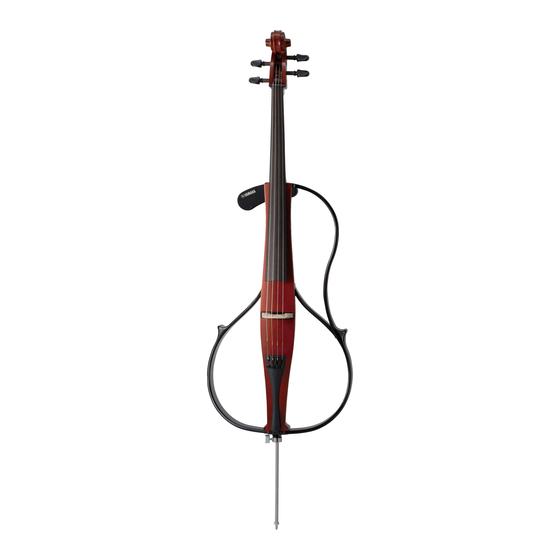Yamaha Silent Cello SVC110 Gebruikershandleiding - Pagina 8
Blader online of download pdf Gebruikershandleiding voor {categorie_naam} Yamaha Silent Cello SVC110. Yamaha Silent Cello SVC110 13 pagina's. Yamaha silent electric cello owner's manual
Ook voor Yamaha Silent Cello SVC110: Gebruikershandleiding (12 pagina's), Servicehandleiding (29 pagina's)

■ Tuning and Changing the Strings
The SILENT Cello™ is shipped from the factory with the
bridge unfitted. First, set up the bridge and then proceed
with tuning.
As the strings get old, sound quality will gradually decrease,
and it will become difficult to tune the instrument. Change
the strings as soon as you think they are getting old.
• The end of the strings are sharp and can cut fingers. Use caution
when changing strings.
• When changing or adjusting strings, do not put your face close
to the instrument. The string may suddenly break resulting in
eye or other unexpected injuries.
• The lower side of the bridge supports the 1st string (A), the higher
side supports the 4th string (C). Make sure the bridge is placed
properly, then set the bridge in the bridge seat. The side of the bridge
with the logo imprint should face the tailpiece.
• Ensure that the bridge stands vertically. If it leans to one side, use
both hands to adjust. Make sure that each string passes over the
corresponding slits in the bridge.
Make sure that the strings are resting in their
appropriate grooves in the bridge when playing
Caution
the instrument.
Strings may come out of their grooves when adjusting the bridge
or changing strings. Since the first (A) and fourth (C) strings tend
to come out of their grooves easily, use your fingers to hold the
strings gently in place when tuning the instrument.
Always make sure that the bridge is standing vertically,
whether the instrument is being played or stored.
Even if the bridge is standing vertically before tuning, it may tilt
during the tuning process. If so, readjust the bridge so it stands
vertically.
It is very important that the bridge stands vertically. If it leans in
either direction it will impair the sound and risk damaging the
instrument.
• The strings are tuned to the following pitches. The 1st string is tuned
to A, the 2nd string to D, the 3rd string to G, and the 4th string to C.
Use a piano, tuning fork, tuner, etc., and adjust the pitch of each string
using the tuning pegs. When rotating the peg, apply firm pressure
towards the head stock.
• Finally, use the adjuster to fine tune the strings.
8
Set up
3rd string (G)
4th string (C)
G
D
C
4th string
Slit
[Looking from the tailpiece]
Bridge seat
Bridge feet
Correct
Bad
Body
Escutcheon
G
D
C
[Make sure that the strings do not
come out of their grooves]
[Bridge is placed vertically]
A
1st string
Logo
imprint
Bad
Vertical
Tailpiece
A
2nd string (D)
1st string (A)
